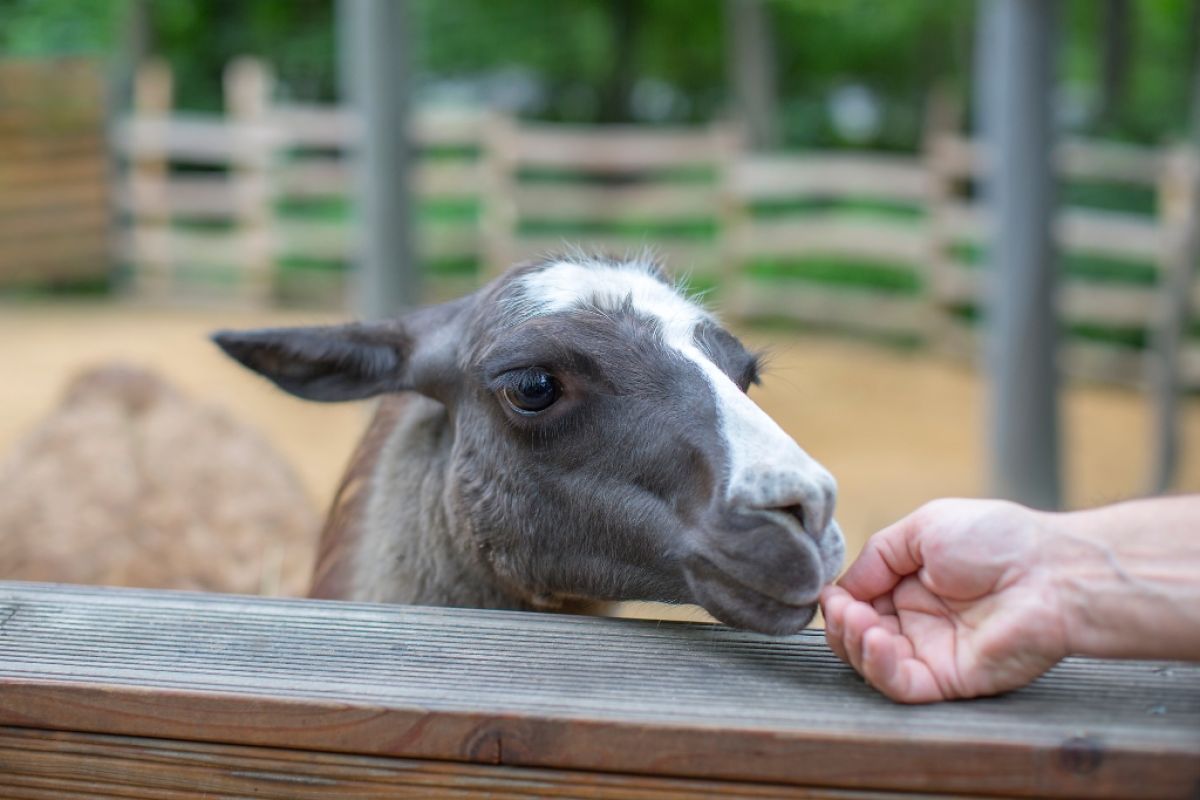Daniel Lassell grew up in Kentucky and lives in Bloomington, Indiana. His first poetry collection, Spit, was selected by Gabrielle Calvocoressi as the winner of the 2020 Wheelbarrow Books Poetry Prize. He is also the author of Frame Inside a Frame (forthcoming, 2025) and two limited-edition poetry chapbooks, Ad Spot and The Emptying Earth.
Welcome to the Poets Weave. I'm Romayne Rubinas Dorsey. Daniel, what poems have you brought for us today?
How to Pet a Llama
Let him sniff you first. Breathe easy.
Look him in the eyes
as you would your mother.
Don’t pat the head.
He doesn’t take being treated
like a dog. Keep your hand
at the neck, your palm down,
as if smoothing out
wrinkled linen. Let your words
slowly out like twine,
like pulling colors from a sleeve,
like a sharing of troubled history.
Llamas carry conversations
as if seated in a rowboat
before fog has lifted, as if pausing
to hear the long echo after
a good shout. Welcome him.
Tenderly, a llama hums—not as if
recalling the tune to a song,
but something longer lost.
Call it a lullaby if you like.
Stand, just the two of you.
Let your breath mingle
as in cold, the air on tiptoe.
Mom Woke to a Coyote Staring in Her Window
And now I hear the pack, wayward, yipping
along the fences, the llamas’ pastures.
I hurl myself with my siblings
down a long string of gravel into darkness
without a weapon, only our yelling.
We tumble our arms into air,
scoop sticks, hammer an empty oil drum
—every action hawkish, frantic
to prevent dimpled limbs, flustered wool,
bellies hooked open like grain bags.
Meanwhile in the fields, the llamas shape
themselves a circle, siloing their young.
The clamoring flinches, then recedes,
the shadows of knee-high shoulders
turning the hills into blurred absence,
a silence climbed into substance.
Tonight, each living creature becomes
an almanac in mud, having pressed
their pads into the earth and the earth
having embraced them.
Wheatgrass empties in wind, stems
leaning and rising, a rhythm of lungs.
Does everything wail like a body?
Somewhere, the coyotes
untangle their teeth from tendons,
warming themselves
with the displaced light of others.
Taking in the Stray
The day I found you in the barn, wandered from home or orphaned, you had so many ticks you lost your sight from blood loss. As you regained your eyes, I helped you find your way about the house—this place my family welcomed you and you could call your own. And you certainly did. The way you sprawled on couches. The way you consumed rabbits and breezed inside to vomit them on carpet. The way you ate field mice with their tails writhing, noodles through your teeth. And the time you brought home a deer limb, crossing the cattle guard to tear its flesh in front of the llamas as they looked around to see if one of them had misplaced a leg. You devoured so many sinless creatures. Yet, I still remember the time you curled beside a fawn to guard it from coyotes. After you had eaten its mother.
The Llama Named James and John Sons of Thunder
Mom named him that because she’s into the Bible. When you live on a farm, every animal receives a name. This is what a Christian household looks like. So, we called that llama James and John Sons of Thunder. Two names in one llama, the Trinity in a lesser form. A symbol for expansive personhood. But my brothers and I joked it referred to his testicles: those sons of Thunder. Those sons who bulged in summer heat, who shriveled on crisp mornings. Those sons who drove him to straddle the fence line in pursuit of females. And led to his castration. That day the vet cut them out, scalpeling the sack and loosening them from their hold, my brothers and I stood with sunken shoulders, witnessing a funeral. Two little orbs emerged, cupped from the heat, white like a molded sphere of dried candle wax. I watched them disappear into the woods. (Did you know they bounce?) The llama’s head voiced nothing, tongue limp in the barn floor dust. Now he’s just called Thunder.
An Account of a Llama’s Death
Zipporah died two days ago. A good llama, she watched over newborn crias. Guarded the herd at night against coyotes. She was kind even to the youngest of my siblings. Dad tied her body to the bush hog and dragged her to a pit beneath the big tree at our property’s end, the family gravesite where all our animals rest. There, he cut the engine and tussled her into the earth. My siblings and I looked upon her stiffened bulk, already losing wool. She had outlived many younger than her. We shoveled dirt to blanket her from winter, while clouds rolled on the horizon to drag a cold front in.
You've been listening to the poems of Daniel Lassell on the Poets Weave. I'm Romayne Rubinas Dorsey.







